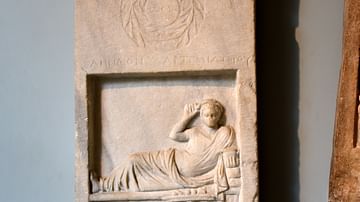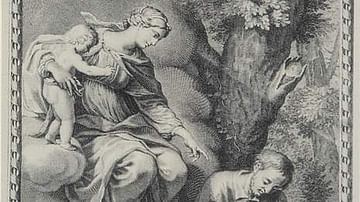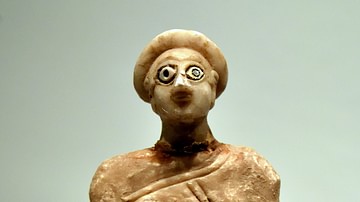Search
Did you mean: Freyr?
Search Results

Article
Sojourner Truth's Escape from Slavery
Sojourner Truth's Escape from Slavery comes from the Narrative of Sojourner Truth, an account of the famous abolitionist's life as given to her friend and admirer Olive Gilbert and published in 1850. The story of her "walking away" from slavery...

Article
The Confessions of Nat Turner
The Confessions of Nat Turner (1831) is the first-person account given by the rebel slave leader Nat Turner (l. 1800-1831) to the attorney T. R. Gray (l. c. 1800-1843) following Nat Turner's Rebellion in Virginia (also known as the Southampton...

Article
Curses & Fines on Epitaphs
The concept of a curse laid on a tomb or gravesite is best known from ancient Egypt but the practice was quite common in other civilizations of antiquity. The tomb or grave was the eternal home of the physical remains of the deceased to which...

Article
Boethius: First of the Medievals?
Anicius Manlius Severinus Boethius (c. 477-524/525) was a scholar in Late Antiquity who was imprisoned and executed by Theodoric (r. 493-526 CE) but was later idolised by medieval intellectuals. His most famous work was De consolatione philosophiae...

Article
Poor Man of Nippur
The Poor Man of Nippur (c. 701 BCE) is a Babylonian poem on the themes of the obligations of hospitality and revenge for an undeserved injury. A poor man of the city of Nippur feels mistreated when he visits the mayor and then goes to great...

Article
Loyola's Spiritual Exercises
The Spiritual Exercises of Ignatius Loyola (1548) is a manual of disciplines formulated by Ignatius Loyola (l. 1491-1556) to prepare one spiritually for Christian service. They were initially developed between 1522-1524 by Loyola for himself...

Article
Lost Treasures From Iraq: Revisited & Identified
For how long do we build a household? For how long do we seal a document? For how long do brothers share the inheritance? For how long is there to be jealousy in the land(?)? The Epic of Gilgamesh, chapter 10, Tablet X. I have always...

Article
Reverend James Drummond MacGregor's Letter to a Clergyman - Urging Him to Set Free a Black Girl He Held in Slavery
James Drummond MacGregor (1759-1830) was a Presbyterian minister in Pictou, Nova Scotia, who became the first published abolitionist in Canada through his A Letter to a Clergyman Urging Him to Set Free a Black Girl He Held in Slavery (1788...

Article
Famous Grammarians & Poets of the Byzantine Empire
In the wake of the downfall of the Western Roman Empire and the intellectual collapse of Athens, Byzantine scholars engaged in preserving the Classical Greek language and its literature. Thus they became the guardians of a vanished culture...

Collection
Religion in Ancient Greece
The ancient Greeks believed the gods were an ever-present influence on humanity, for both good and bad. The belief that these gods might be influenced in turn is evidenced in the widespread building of temples dedicated to them as well as...